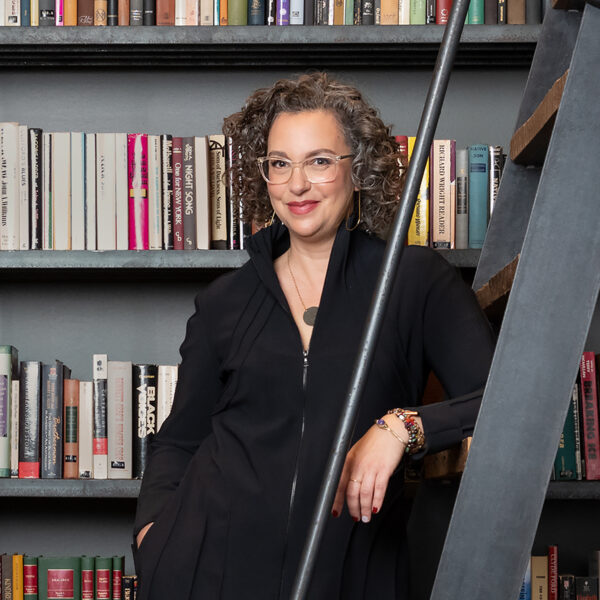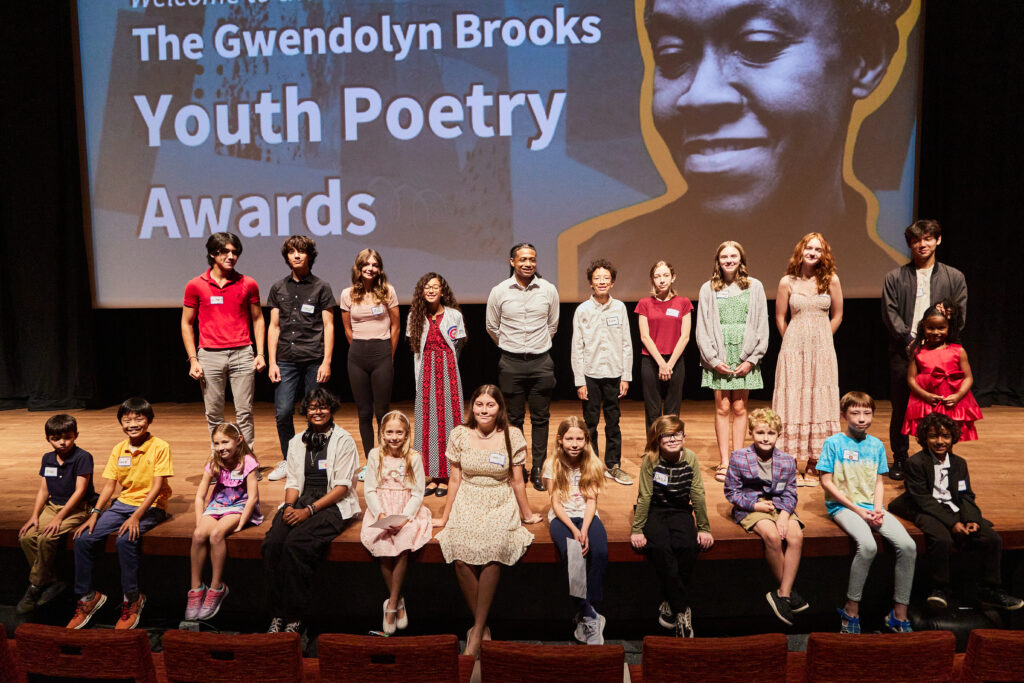
I keep seeing articles about the erosion of the Humanities in the academic sphere. Maybe you have, too. But in the public sphere the humanities aren’t only alive and well, they’re accomplishing feats unlike any other effort: they are the thing equipping us to be able to be a diverse, complex society.
The public humanities were on full, radiant display throughout the state this past month in Illinois.
What do the public humanities look like?
They look like the September 9th Gwendolyn Brooks Youth Poetry Awards.
I wasn’t the only one delighted by Giganto Cat, written by Kindergartener Glenn Cambalik of Oak Park. That jewel of a poem was shared in an awards ceremony that included a riveting performance by avery r. young, Chicago Poet Laureate, the inaugural reading of a new poem, Something Happens by our State Poet Laureate, Angela Jackson, and the unpacking of Gwendolyn Brook’s purse by her daughter, the ineffable Nora Brooks Blakely.

The public humanities look like young people describing their lives, their hopes, their fears, their visions in the shape of poems on a stage in front of mostly strangers. The humanities were in the poems and the performances, but they were also inherent in the choice young people and their families made to gather together, to see, to hear, and to be heard.
The public humanities look like recent gatherings in Urbana-Champaign.

An Illinois Humanities Envisioning Justice Activation event on September 19th, created in partnership with FirstFollowers, was designed to make space for individuals serving, and being impacted by, long-term sentences to explore ideas about how to create justice. When artist and organizer Renaldo Hudson shared the impact of the carceral system on his life he asked the 70+ people gathered in the room to remember, “We are so much more than they want us to think we are.”
The public humanities are places and spaces where, by coming together, we more fully realize who we are and who we can be.
The public humanities happened the next day when Illinois Humanities hosted a statewide convening of the Envisioning Justice network of humanists, organizers, and scholars. Mikki Kendall opened up the space for conversation by weaving personal stories, research, and her unfettered opinions, in a way that liberated a space for sincere conversation.
The public humanities are visible when people are able to curiously, and sincerely, ask questions of one another to better understand someone else’s point of view.
You’ll know the public humanities when you see these things.
- The public humanities create a public – it’s a gathering people choose to come to – and the people who gather may not already know each other.
- People are being talked with, not talked at. People are learning “with,” not just learning “from.”
- The public humanities ask people to employ capacities we inherently hold as humans – being curious, listening closely, changing our minds, embracing complexity and nuance. The public humanities call upon us to use, practice, and develop ways of engaging with one another that help us discern our own beliefs, expand our understanding of what is possible, and appreciate that differences make us stronger. These particularly human abilities are like any other skill: they get better with practice and, when underdeveloped or unattended to, become rough.
Ultimately, the public humanities is what happens when we can come together to have the conversations we want to have but don’t quite know how to have. And the humanities are happening all around us in Illinois. When our new website launches next month(!) you’ll find a map on the home page showcasing organizations that are making the humanities happen in nearly every county, every month.
We cannot have the public humanities on our own; we can only have it together. We thank you for being part of the community that knows the public humanities when you see it – and for supporting the humanities to make Illinois more just, livable, and connected.
About Illinois Humanities
Illinois Humanities, the Illinois affiliate of the National Endowment for the Humanities, is a statewide nonprofit organization that activates the humanities through free public programs, grants, and educational opportunities that foster reflection, spark conversation, build community and strengthen civic engagement. We provide free, high-quality humanities experiences throughout Illinois, particularly for communities of color, individuals living on low incomes, counties and towns in rural areas, small arts and cultural organizations, and communities highly impacted by mass incarceration. Founded in 1974, Illinois Humanities is supported by state, federal, and private funds.
Learn more at ilhumanities.org and on Facebook, Twitter, Instagram, and LinkedIn @ILHumanities.
Featured Image: (Left) A young poet reads their winning poem during the Gwendolyn Brooks Youth Poetry Awards ceremony. (Top-right) Denzel Burke presents Nora Brooks Blakely with flowers. (Lower-right) Chicago Poet Laureate avery r. young performs a reading for young writers and their families and friends. (Photos by Glitter Guts)